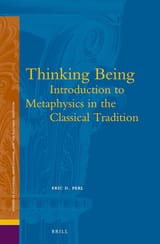Search Results
7/7/2025, 2:22:17 AM
>>24527773
Kant is responding to his own immediate tradition in its terms. I don't think the critical turn actually ends up "refuting" or undermining older traditions in the way it is often taken too (e.g. any with notions of noesis/intellectus). Thomism, for instance, isn't dealt much of a blow, and one might say the same of Aristotle and many of his commentators, not to mention the Augustinian tradition. Kant's critique ultimately fails to land much outside the Enlightenment because it is stuck with its presuppositions.
Burgess book is ok on this because it is broad, but there are much more in depth rebuttals for specific traditions, particularly Thomism since it still claims a lot of adherents. His original dissertation which became the book is free: https://theses.gla.ac.uk/2741/
Ultimately, I don't blame Kant. He was not an expert on ancient or medieval thought, and was seemingly ignorant of the via antiqua and the doctrina signorum (which C.S. Peirce uses to resurrect realism). I blame the generations of incautious philosophers who treated Kant as presuppositionless and assumed his criticism fit more broadly without checking.
The same sort of thing seems to have happened with Wittgenstein, and to a lesser extent Quine. Their arguments from underdetermination were not unknown to the ancients and medievals. They are only seen as absolute today because of certain assumptions deeply engrained in empiricist epistemology, but these are questionable when actually examined, especially when they lead to these radical conclusions (conclusions of the sort that one might figure disqualify an epistemology DESU).
Kant is responding to his own immediate tradition in its terms. I don't think the critical turn actually ends up "refuting" or undermining older traditions in the way it is often taken too (e.g. any with notions of noesis/intellectus). Thomism, for instance, isn't dealt much of a blow, and one might say the same of Aristotle and many of his commentators, not to mention the Augustinian tradition. Kant's critique ultimately fails to land much outside the Enlightenment because it is stuck with its presuppositions.
Burgess book is ok on this because it is broad, but there are much more in depth rebuttals for specific traditions, particularly Thomism since it still claims a lot of adherents. His original dissertation which became the book is free: https://theses.gla.ac.uk/2741/
Ultimately, I don't blame Kant. He was not an expert on ancient or medieval thought, and was seemingly ignorant of the via antiqua and the doctrina signorum (which C.S. Peirce uses to resurrect realism). I blame the generations of incautious philosophers who treated Kant as presuppositionless and assumed his criticism fit more broadly without checking.
The same sort of thing seems to have happened with Wittgenstein, and to a lesser extent Quine. Their arguments from underdetermination were not unknown to the ancients and medievals. They are only seen as absolute today because of certain assumptions deeply engrained in empiricist epistemology, but these are questionable when actually examined, especially when they lead to these radical conclusions (conclusions of the sort that one might figure disqualify an epistemology DESU).
6/29/2025, 5:22:41 PM
>>24506194
>>24506137
These critiques don't demonstrate a basic familiarity with the conclusion. The First Cause, First Moved, First Principle, and Necessary Subsistent Being is also Goodness and Truth itself (4th way). The Fifth Way is more obviously related to the fact that God is intellect but the idea of being outside intellect is alien to all of classical metaphysics and requires the materialist elevation of potency over act to even be dreamed up (and even then it is arguably incoherent). "The same is for thinking as for being."
>>24506137
These critiques don't demonstrate a basic familiarity with the conclusion. The First Cause, First Moved, First Principle, and Necessary Subsistent Being is also Goodness and Truth itself (4th way). The Fifth Way is more obviously related to the fact that God is intellect but the idea of being outside intellect is alien to all of classical metaphysics and requires the materialist elevation of potency over act to even be dreamed up (and even then it is arguably incoherent). "The same is for thinking as for being."
6/18/2025, 3:14:50 PM
>>24476114
Aquinas is full of demonstrations from fairly unobjectionable first principles. So is Aristotle.
Your critique seems to demonstrate a lack of familiarity with the topic. The whole point for the Scholastics is that philosophy isn't a system as the moderns has it. Gilson and Maratain make just this argument, as does Schindler more recently. True philosophy, on their account, is always radical openess.
Second, they accuse modern scientism, justly, of using skepticism and the appearance of humility to make absolutizing statements. For instance, the very idea that one can bracket economics from politics presupposes that the whole is irrelevant to the parts, a suppositions supported by appeals to ignorance. Liberalism is guilty of this vis-á-vis man's telos. It proposes skepticism and ignorance, then uses this to demand a totalizing political system.
Aquinas is full of demonstrations from fairly unobjectionable first principles. So is Aristotle.
Your critique seems to demonstrate a lack of familiarity with the topic. The whole point for the Scholastics is that philosophy isn't a system as the moderns has it. Gilson and Maratain make just this argument, as does Schindler more recently. True philosophy, on their account, is always radical openess.
Second, they accuse modern scientism, justly, of using skepticism and the appearance of humility to make absolutizing statements. For instance, the very idea that one can bracket economics from politics presupposes that the whole is irrelevant to the parts, a suppositions supported by appeals to ignorance. Liberalism is guilty of this vis-á-vis man's telos. It proposes skepticism and ignorance, then uses this to demand a totalizing political system.
Page 1
